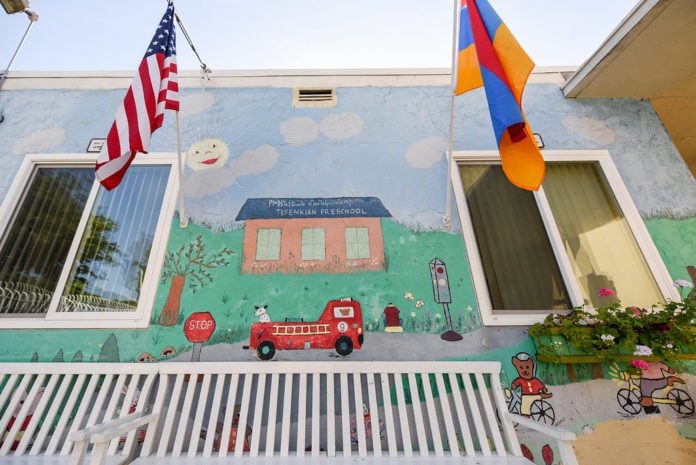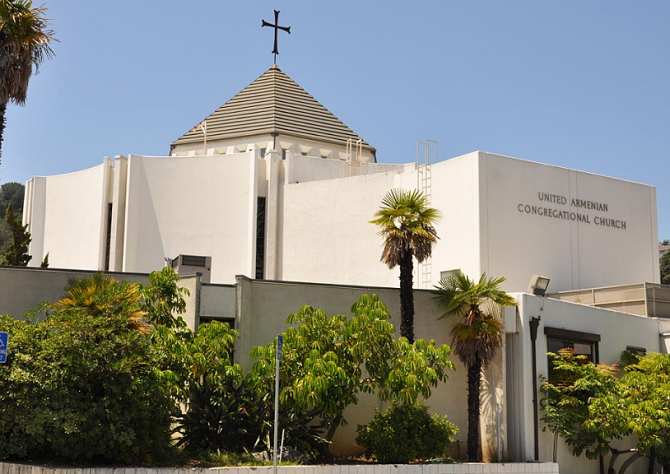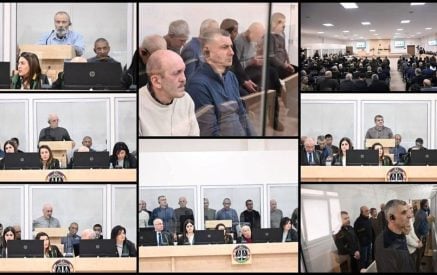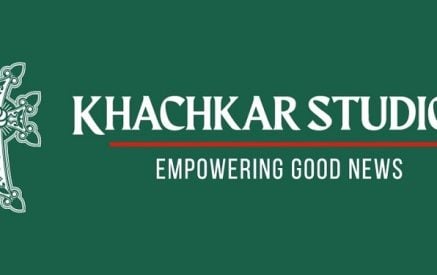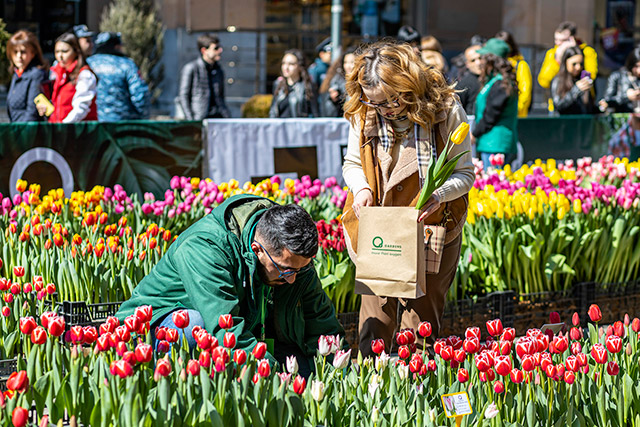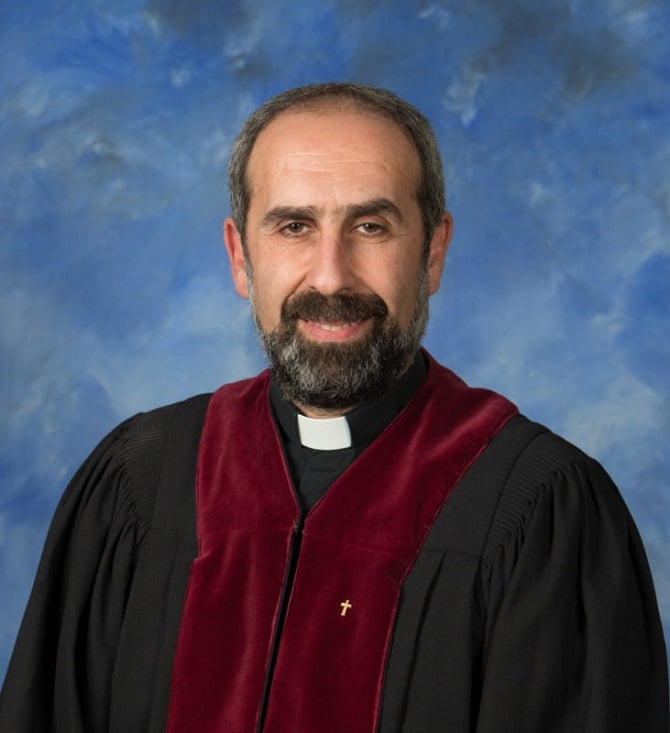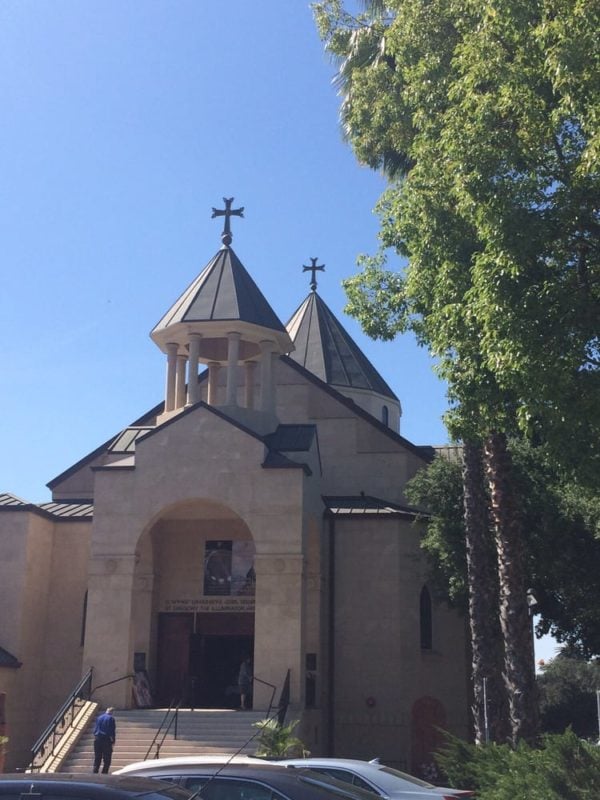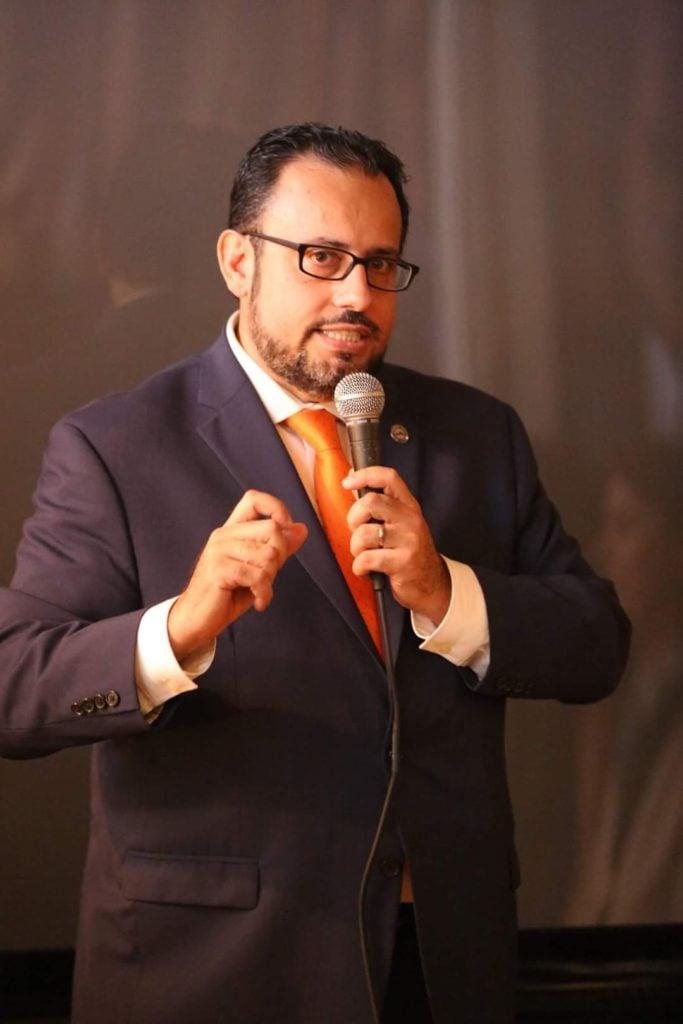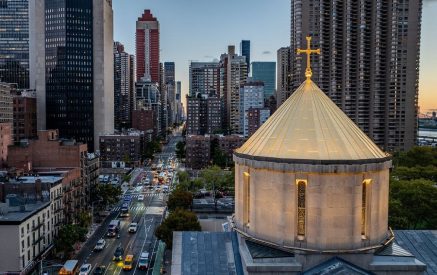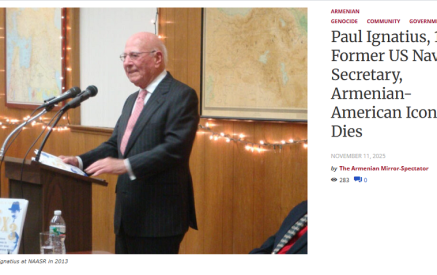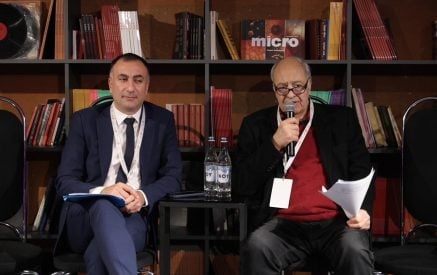The Armenian Mirror-Spectator. GLENDALE/PASADENA, Calif. – Armenian churches, schools and organizations are all finding ways to adapt to the restrictions of life with COVID-19. Physical interactions are being replaced as much as possible through alternative methods of outreach. What follows is only a limited sampling of what is taking place in this large Armenian community. No doubt more coverage will follow in upcoming weeks.
Churches
Churches are in general closed physically to the public. Rev. Hendrik Shanazarian, associate pastor at the United Armenian Congregational Church of Los Angeles, said that his church continues to reach people through livestreaming of services, as well as dissemination of recordings. Meetings take place via Zoom, Facebook or other software. The telephone is a great tool allowing clergy to keep in touch with the populace, especially the elderly who may use the Internet less than others.
Rev. Serop Megerditchian, senior pastor of Armenian Cilicia Evangelical Church in Pasadena, painted a similar picture of his church’s situation. He said, “As everywhere, here too there are some fears, though not panic. When they hear the news on the situation in the East Coast, this gives a negative picture.” He said that he receives from community members in Pasadena and Glendale 30-40 requests daily by phone and internet for prayers from families in difficult situations. Some call at 11 p.m. or midnight.
Read also
They are depressed and staying at home in a situation that seems like a sort of imprisonment, he said. Those with families may have difficulties in coping with children who are now always at home.
“Many were not interested in God before, but now they ask whether what has happened is the end of the world. Is God punishing us? Is Jesus coming to the world? Is it the result of our sins?”, Rev. Megerditchian continued. He gives some counselling and prayers but may direct callers to specialists or doctors if that appears necessary.
Rev. Megerditchian himself calls to see how people are and offers to help with shopping if individuals are alone and unable to go outside. Bible studies are done via Zoom.
Fr. Sarkis Petoyan of St. Gregory Armenian Apostolic Church of Pasadena confirmed that his church too is closed physically, and all auxiliary activities cancelled. He said he went a few hours each week to the office, while the office secretary worked remotely from home.
He conducted services in the church which were being made accessible online. On Palm Sunday, for example, almost 6,000 individuals or families followed the badarak or mass remotely, whereas in past years 6-700 would physically be present.
Fr. Petoyan exclaimed, “The response from my texts and emails, and telephone calls, has been incredible. I think the people were really looking for a message of hope. They are thinking we cannot even take church for granted. People who never would have even approached me in the past have really expressed their appreciation for the message of hope yesterday, Palm Sunday.” This was unlike any other Palm Sunday response. People are really searching.”
Fr. Petoyan said that people would also call his office just to talk, while he too keeps telephoning parishioners daily to let them know their parish priest was thinking of them. He said that he sends out a weekly emailing that speaks to their fears and gives a one-page message. If people are truly alone, he provides them help. He has offered shopping assistance but so far, he said, everyone has family or friends to help them.
At the same time, he said that the Armenian population in Pasadena was a tough one. They or their parents went through the Beirut civil war and the turmoil and fighting in Iraq and Aleppo. Those from Armenia also saw many hardships. So, he concluded, “I cannot say that they are indifferent but I can’t say that they are paranoid either.”
In general, Armenians and non-Armenians in Pasadena were behaving properly and the city streets were completely empty, he said.
One unusual aspect of the coronavirus crisis is that people are being let out of Los Angeles County jails (see this LA Times article). The vast majority, according to Sheriff Alex Villaneuva, are those with 30 or few days left in their sentences or people being held on bail of $50,000 or less. As of March 23, approximately 1,700 inmates had been released, and another group of inmates awaiting trial for nonviolent, nonserious charges were being considered for release.
It turns out that some of those being released are Armenians. Fr. Petoyan said that he was getting calls from states remote from California saying that my son is getting out of jail in California but has no money and needs help and housing. He has gotten two calls of this nature, which means there are probably more who do not contact him. Fr. Petoyan helps these inmates as much as feasible.
The church, like the overall populace, is affected detrimentally by the economic crisis created by the pandemic. It has five units of housing adjacent to its property and three of the renters asked for a break. Fr. Petoyan said that the church understands the situation and will be lenient though it also has its own debt to pay off.
Schools
St. Gregory Alfred and Marguerite Hovsepian School in Pasadena operates under the auspices of St. Gregory Church. Fr. Petoyan said that from kindergarten to eighth grade every class is now working online, though it was a lot of work for the faculty to set this up. He said, “So far, we are able to keep all staff. We don’t want to let anybody go or suffer. We will take a financial hit if we have to. We are all family.”
The real challenge for the shift to online learning, he said, is the pre-kindergarten, with 70-80 children from 3 to 5 years old. The school is offering 2-3 days a week online learning, on a limited basis, for the older children of this group.
School principal Shahe Mankerian said, “Our goal, at Hovsepian School, is to accommodate our preschool-8th grade parents and students by keeping a sense of normalcy. We are keeping our students engaged and invigorated with daily live and recorded sessions. We are testing new ideas, particularly with preschool. We are looking ahead. Virtual learning is here to stay. We believe we have to be ready for future COVID-19 flareups, and we have to be ready to offer quality curriculum virtually.”
St. Mary’s Richard Tufenkian Pre-School and Kindergarten in Glendale and the St. Sarkis Armenian Church Levon and Hasmig Tavlian Preschool and Kindergarten in Pasadena have physically closed, like all other schools. The preschools, with children between 2 ½ and 4 years old, are no longer operating but the kindergarten students receive instruction via Internet for kindergarten students.
The Vahan and Anoush Chamlian Armenian School is another school in Glendale which has transitioned to online elementary school classes. Chamlian, Tufenkian and Tavlian all are subject to the Board of Regents of Prelacy Armenian Schools, but make their own decisions. In general, assistant teachers and preschool teachers are on furlough, along with janitors and some other non-teaching staff, but all others have been kept.
All private Armenian schools are facing great financial pressure, just as their students’ families are. The situation may get worse if the US economic recession turns into a depression.
Organizations
The activities of Armenian community organizations have been circumscribed. One example is provided by Mihran Toumajan, who is Western Region Director of the Armenian Assembly of America. Toumajan said, “Like most people, we are working remotely, teleworking and using video conferencing and other sorts of conferencing to communicate to one or multiple people. It is something we used to do but now we do it in a much more frequent and routine fashion.”
The programming prepared or promoted by the Assembly for the spring and summer has been postponed for the most part, but some events are being transferred to the virtual realm. For example, “Teaching Film with Testimony,” an educational forum on the Armenian Genocide by the University of Southern California Shoah Foundation that was supposed to take place at Wayne State University in Michigan on April 1 for middle and high school teachers, was turned into a webinar for April 14. The associate producer of “The Promise,” a major film on the Armenian Genocide, will participate. The silver lining, Toumajan said, is that as an online event it was open now to anyone.
Toumajan is the host of the Armenian Assembly of America Radio Hour, the episodes of which are available online after initially being broadcast on Thursday evenings. The radio hour began in January of this year and will continue to provide new discussions weekly on Armenian affairs that will perforce take place solely in the digital realm.
Meanwhile, Toumajan said that the Assembly continues to speak with US Congressional offices, and looks forward to having call-ins with some members of the House of Representatives. He said that this would be the equivalent of a face-to-face meeting during a recess period, for example. On the other hand, for Armenian organizations, Toumajan said, “The challenge is that naturally many of the members of the House and Senate are devoting most of their time to COVID-19 matters and its effects on the economy.” Nonetheless, the leadership of the Armenian Caucus is certainly spending time on issues besides COVID-19.
While the Assembly is working for aid to Armenia, and appreciative recently for US aid for fighting COVID-19 in Armenia, Toumajan in his personal capacity expressed concern over the difficult situation for the Armenian community in the Middle East. COVID-19 is spreading rapidly in Lebanon, for example, which has faced a serious economic crisis while Armenians welcomed Armenian refugees from Syria, itself in a desperate situation. What will be tricky for the Armenians of the US, he agreed, is to balance all the needs of Armenians in Armenia, the Middle East and now in the US itself during this crisis period.
Toumajan praised the cooperation among the three major committees with distinct April 24 programming annually in the Los Angeles area, which are the United Armenian Council of Los Angeles (UACLA), in charge of the programming at the Montebello Armenian Martyrs Memorial; the Unified Young Armenians (UYA), which does a march and rally in Little Armenia; and the Armenian Genocide Committee (AGC), which consists of over 20 Armenian community organizations that have a march in front of the Turkish consulate in Los Angeles. Since January, the three organizations have been meeting weekly to cooperate and present a unified message to the media.
Now with the pandemic enveloping everyone’s lives, Toumajan said that the coordination continues, but events will basically occur in the digital or virtual realm. The Armenian Assembly is a dues-paying member of both UACLA and AGC.
The Assembly, Toumajan said, is continuing to work with the Los Angeles County Board of Supervisors, especially Supervisors Kathryn Barger and Janice Hahn, in celebrating Armenian history month in April. The Board will continue to honor Armenian-Americans who have contributed significantly toward the betterment of the people of Los Angeles County. However this year this will not be in person. Instead, honorees will receive certificates by postal mail.
During the COVID-19 crisis, the Assembly encourages Armenians to donate blood to the American Red Cross to help fellow Americans.
Toumajan is the current chair of the Pan Armenian Council of [the] Western USA, which was formed in August 2019 as a consultative coalition. It has 24 organizational members at present and its chairmanship is a rotating one. The council held an audio meeting at the end of March and issued a statement dated March 27 (see the Mirror-Spectator) calling for unity and obedience to local health regulations concerning the coronavirus. It will soon issue a press release listing resources that Armenians might use in this situation.
Toumajan pointed out that according to its charter, the council cannot organize events or projects or do fundraising. It is there to offer guidance and to provide a sense of what is acceptable and what is not in the community, he said. It is following emerging difficulties for the local community. One is the aforementioned pressure on Armenian private day schools due to the virus and financial difficulties.
Main caption: St. Mary’s Richard Tufenkian Pre-School and Kindergarten



















































